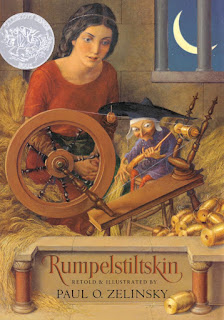"Rumpelstiltskin" by Paul O. Zelinsky
Bibliography
Summary
A young girl is locked away and told to spin straw into gold
or she will die. Lucky for her, a tiny little man comes to her rescue multiple
times and only asks for her first born child in return! She doesn’t want to
give up her baby boy so she must guess his name to save her child.
Analysis
I have to start this by sharing something I found when I
opened this book. This is the exact same copy of Rumpelstiltskin I read when I was just a kid, (probably 20 years
ago), and it was no less wonderful two decades later. The storyline follows the
typical Rumpelstiltskin tale we all know and love with only one or two little
details that may be changed from culture to culture. This Rumpelstiltskin rides
around on a magic spoon and does not rip himself in half when robbed of his
infant prize. There is really nothing special about the actual text in the
story. It does a good job of carrying the message without being convoluted or
too fantastical. It is straightforward and has understandable vocabulary. It is
textually unextraordinary.
What sets
this particular retelling apart are the illustrations. They are detailed and
large and vivid. There are countable cobblestones in the castle, individually
identifiable spools in baskets and the straw seems like you should actually be
able to feel it when you touch the image. Such great pain is taken in each illustration
that the reader actually feels that this is a real story told about people in
history books. This particular version is not as animated as many others in its category, lending to that realistic feel.
Even
little Rumpelstiltskin looks harmless enough, in the beginning, with a helpful
glint in his eye. You can read the stress, the fear and the confidence on the
faces of the characters, even if you cannot read the words.
Zelinsky
even includes a brief explanation of his version of the tale at the end of the
book, giving us a history with our story. All in all, this would be a great book to teach children to be careful who they trust because even a tiny little man with a helpful face can cause trouble! The section at the end can also be a lesson in how organic story writing can be, even for professionals.
Awards
Caldecott Honor Book, 1987

Comments
Post a Comment